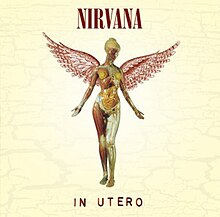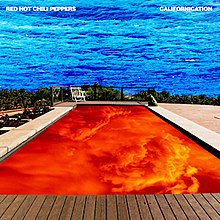milo
Jack L. Jones
In the heavyweight bout of the round Nirvana take on the Red Hot Chili Peppers. Only one can be victorious but who will it be?
Nirvana - In Utero

In Utero is the third and final studio album by the American rock band Nirvana, released on September 21, 1993, by DGC Records. Nirvana intended the record to diverge significantly from the polished production of its previous album, Nevermind (1991). To capture a more abrasive and natural sound, the group hired engineer Steve Albini to record In Utero during a two-week period in February 1993 at Pachyderm Studio in Cannon Falls, Minnesota. The music was recorded quickly with few studio embellishments, and the song lyrics and album packaging incorporated medical imagery that conveyed frontman Kurt Cobain's outlook on his publicized personal life and his band's newfound fame.
Soon after recording was completed, rumors circulated in the press that DGC might not release the album in its original state, as the record label felt that the result was not commercially viable. Although Nirvana publicly denied the statements, the group was not fully satisfied with the sound Albini had captured. Albini declined to alter the album further, and ultimately the band hired R.E.M. producerScott Litt to make minor changes to the album's sound and remix the singles "Heart-Shaped Box" and "All Apologies".
Upon release, In Utero entered the Billboard 200 chart at number one and received critical acclaim as a drastic departure fromNevermind. The record has been certified five times platinum by the Recording Industry Association of America, and has sold 15 million copies worldwide.[2]
Vs

Californication is the seventh studio album by American rock band Red Hot Chili Peppers. It was released on June 8, 1999,[2] onWarner Bros. Records and was produced by Rick Rubin. Californication marked the return of John Frusciante, who had previously appeared on Mother's Milk and Blood Sugar Sex Magik, to replace Dave Navarro as the band's guitarist. Frusciante's return was credited with changing the band's sound altogether, producing a notable shift in style from the music recorded with Navarro. The album's subject material incorporated various sexual innuendos commonly associated with the band, but also contained more varied themes than previous outings, including lust, death, contemplations of suicide, California, drugs, globalization, and travel.
Californication is the Chili Peppers' most commercially successful studio release internationally, with over 15 million copies sold worldwide,[3] and more than 5 million in the United States alone.[4] As of 2002, the album had sold over 4 million copies in Europe.[5]The record produced several hits for the band, including "Otherside", "Californication" and the Grammy Award-winning "Scar Tissue".Californication peaked at number three on the U.S. Billboard 200. The record marked a significant change in style for the band:Rolling Stone's Greg Tate noted that "while all previous Chili Peppers projects have been highly spirited, Californication dares to be spiritual and epiphanic".[6]
Nirvana - In Utero

In Utero is the third and final studio album by the American rock band Nirvana, released on September 21, 1993, by DGC Records. Nirvana intended the record to diverge significantly from the polished production of its previous album, Nevermind (1991). To capture a more abrasive and natural sound, the group hired engineer Steve Albini to record In Utero during a two-week period in February 1993 at Pachyderm Studio in Cannon Falls, Minnesota. The music was recorded quickly with few studio embellishments, and the song lyrics and album packaging incorporated medical imagery that conveyed frontman Kurt Cobain's outlook on his publicized personal life and his band's newfound fame.
Soon after recording was completed, rumors circulated in the press that DGC might not release the album in its original state, as the record label felt that the result was not commercially viable. Although Nirvana publicly denied the statements, the group was not fully satisfied with the sound Albini had captured. Albini declined to alter the album further, and ultimately the band hired R.E.M. producerScott Litt to make minor changes to the album's sound and remix the singles "Heart-Shaped Box" and "All Apologies".
Upon release, In Utero entered the Billboard 200 chart at number one and received critical acclaim as a drastic departure fromNevermind. The record has been certified five times platinum by the Recording Industry Association of America, and has sold 15 million copies worldwide.[2]
Vs

Californication is the seventh studio album by American rock band Red Hot Chili Peppers. It was released on June 8, 1999,[2] onWarner Bros. Records and was produced by Rick Rubin. Californication marked the return of John Frusciante, who had previously appeared on Mother's Milk and Blood Sugar Sex Magik, to replace Dave Navarro as the band's guitarist. Frusciante's return was credited with changing the band's sound altogether, producing a notable shift in style from the music recorded with Navarro. The album's subject material incorporated various sexual innuendos commonly associated with the band, but also contained more varied themes than previous outings, including lust, death, contemplations of suicide, California, drugs, globalization, and travel.
Californication is the Chili Peppers' most commercially successful studio release internationally, with over 15 million copies sold worldwide,[3] and more than 5 million in the United States alone.[4] As of 2002, the album had sold over 4 million copies in Europe.[5]The record produced several hits for the band, including "Otherside", "Californication" and the Grammy Award-winning "Scar Tissue".Californication peaked at number three on the U.S. Billboard 200. The record marked a significant change in style for the band:Rolling Stone's Greg Tate noted that "while all previous Chili Peppers projects have been highly spirited, Californication dares to be spiritual and epiphanic".[6]

